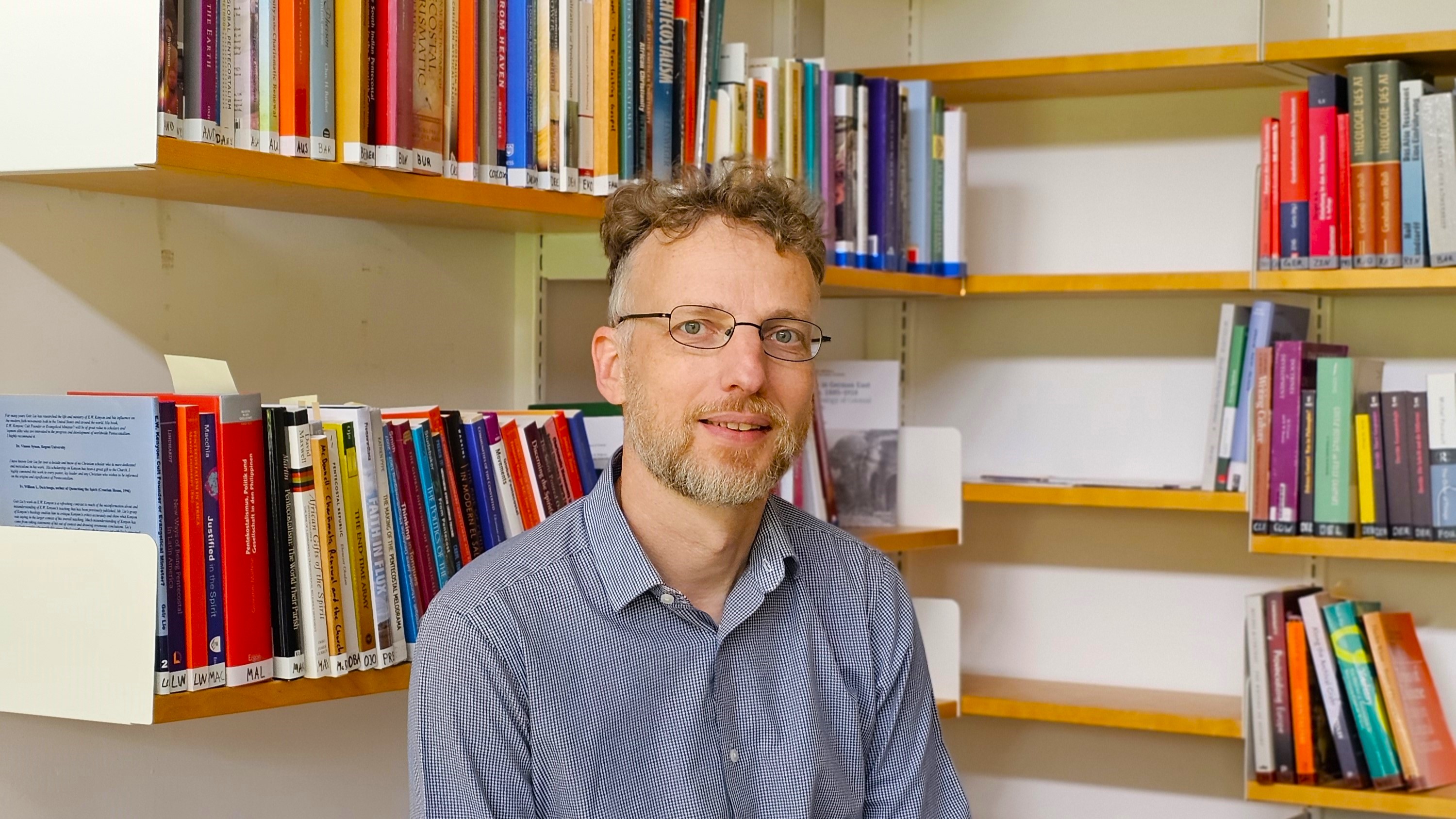
College Position
Director of Studies, Postgraduate Tutor
University Department
Faculty of Divinity
University Position
Associate Professor in World Christianities
Subject
Theology, Religion, and Philosophy of Religion
Research interests
Religion in Africa
You grew up in East Germany. What was life like for you growing up?
It wasn’t all that strange or exotic, but one did wake up to politics quite young. The contrast was just too great between what was taught in school and what we saw on (West German) TV or heard from visiting relatives from beyond the wall. Even as children, we learned to differentiate between the expected ‘official speech’ and what we thought or shared in private. Growing up Christian, I did occasionally see the need to stand up for my faith none-theless, even as I knew this was risking my access to Abitur and university. Thankfully, the system collapsed before this quite common educational discrimination materialised in my life.
The wall came down, and you travelled abroad. What sparked your interest in theology?
As a citizen of Leipzig, I saw the demonstrations first-hand that brought down the government. It was very moving and liberating to be part of a crowd of 300,000 marching around the centre ring road, right by the local Stasi headquarters! When the wall came down a few weeks after it still was a big surprise. Less than two years later I was an exchange student in the USA, absorbing myself in the ‘land of the free’ but also feeling somewhat disillusioned with what I saw there. Returning home came with an equally strange sense of displacement, and I think it is this experience of being a traveller between different worlds that led me to ask larger questions about life. This youthful search for meaning and a strong sense of faith brought me into theology, both to be reconstructed substantially through the critical inquiry the subject entails.
What led you to study religions in Africa?
After my exchange student year, I regularly attended a meeting of international Christian students in Leipzig, most of whom were Ethiopians. I became fascinated with their culture, food and history and even started learning Amharic. After reading Education and Theology in Leipzig University, I was offered a PhD position in global Christianity at the University of Heidelberg. Remembering my Ethiopian friends from years before, I knew exactly what I wanted to research. I wrote the first history of Pentecostal Christianity in Ethiopia, a young and increasingly important religious movement in this traditionally Orthodox and Muslim country. Having imbibed a lot of postcolonial theory, I then wanted to interrogate German colonial history, which led me to my post-doc project on Islam in German East Africa. Luckily, my double expertise in African Christianity and Islam was exactly what SOAS was looking for when in 2013 they advertised a lectureship in religion in Africa. Teaching SOAS’ very diverse student body in the vibrant London atmosphere was a great joy, but the institution also bore the significant strains of the UK higher education system. I gladly opted for the calmer waters of Cambridge when the opportunity arose.
How does your academic past influence your approach to teaching?
As a child, I could have never imagined that one day, I would be teaching and researching at the University of Cambridge. Through historical fortune my world suddenly opened up and I was given opportunities that remain foreclosed to many. Now, as a researcher in Africa, I find myself representing the same unreachable, privileged ‘West’ to many interlocutors, just as my West German relatives did in my childhood. This contingency of privilege drives my teaching. I constantly challenge my students and myself to reflect on our positionality in our inquiries. Whatever achievements and insights we may boast, they are not based on merit alone but the product of global power structures. Equally, the cultures and societies we study are not foreign ‘objects’ to ‘discover’ but linked with our knowledge in deep historical relationships. This means to constantly query our epistemology, in particular when discussing something as normative and powerful as religious beliefs and practices. How did we arrive at the body of knowledge in front of us? What preconceptions do our questions reflect? How can intercultural ‘surprises’ challenge inherited paradigms?
Theology is an ancient study, but belief systems are still a firm part of society. Where does the modern study of theology fit in?
My subject area here in Cambridge is World Christianity — an exciting field that combines history, social sciences, politics and theology in studying how Christian communities globalise, diversify and engage with their cultural surroundings and other religions. In many ways, this perfectly reflects the study of theology and religion of today. The subject is interdisciplinary, multi-religious, and can be studied from an agnostic or a faith-informed perspective. Contrary to what one might think in Western Europe, religion remains an essential part of life almost everywhere in the world, and as such the subject provides a fascinating lens into a whole variety of human culture, conflict, and heritage. As Director of Studies I always enjoy seeing the different paths my students take through this broad offering, and usually it is not the topic that first attracted them to our offer!
When you are not immersed in your duties as Director of Studies and theology, how do you spend your time?
Nature is probably the most important balancing point for me. On holidays, I love to go on long mountain hikes; on normal weekends this sadly shrinks to a run or a walk in some quiet spot. Equally, getting my fingers dirty in the garden helps me unwind. My favourite garden project in the past few years has been a mini wildlife pond, leading me to a totally unexpected fascination with frogs, toads and newts.




